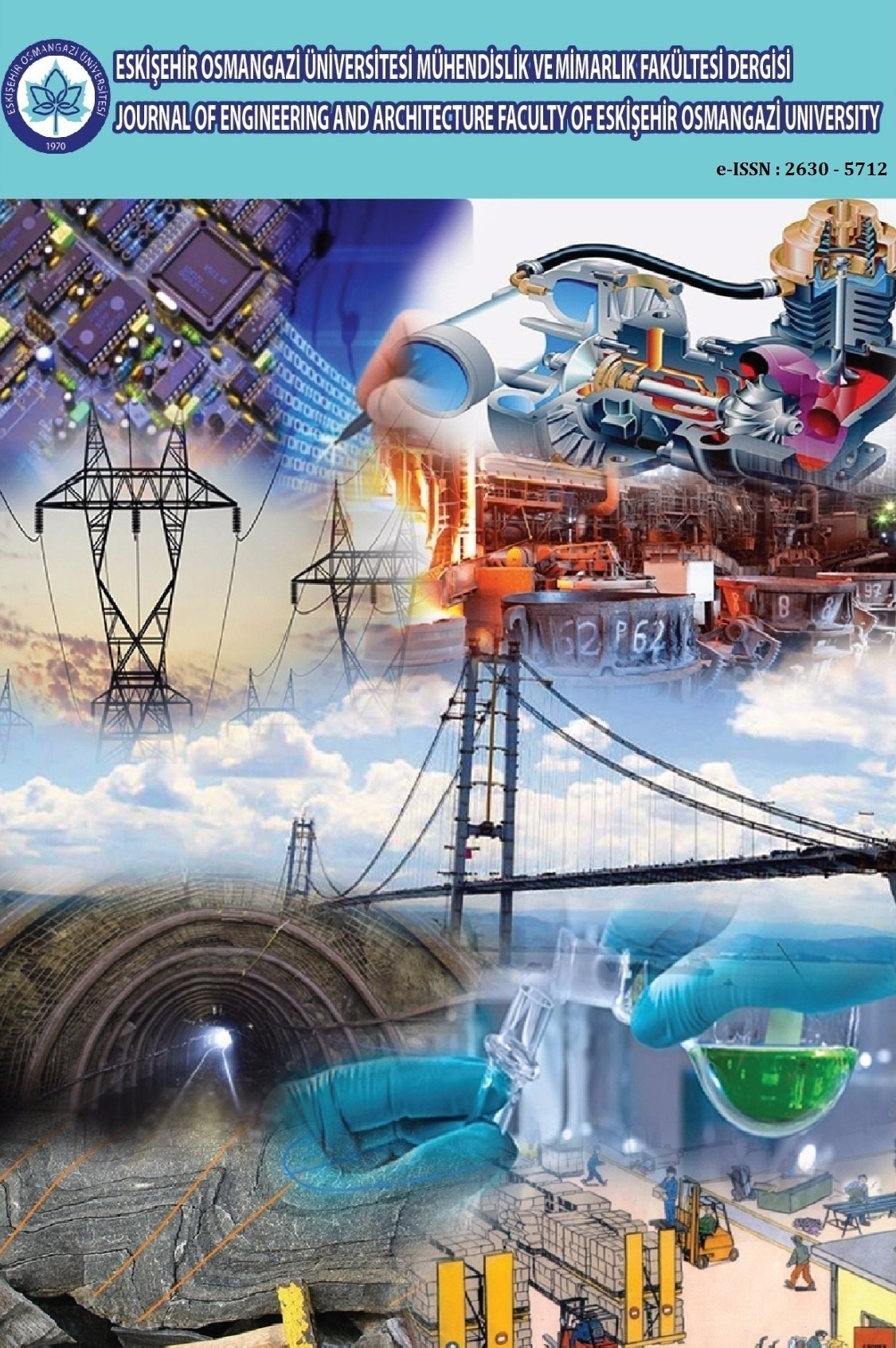Ham Enerji Kaynağı Kısıtlı Termik Birim İçeren Sistemlerde Çevresel Ekonomik Güç Dağıtımı Probleminin Çözümü
Çevresel ekonomik güç dağıtımı, Ağırlıklı toplam metodu, Genetik algoritma, Ham enerji kaynağı kısıtlı termik birim.
Solutıon Of Envıronmental Economıc Power Dıspatch Problem In Systems Wıth Lımıted Energy Supply Thermal Unıts
Environmental economic power dispatch, Weighted sum method, Genetic algorithm, Limited energy supply units..,
___
- [1] S. Özyön, Genetik algoritmanın bazı çevresel ekonomik güç dağıtım problemlerine uygulanması, Yüksek Lisans Tezi, Dumlupınar Üniversitesi, ss. 136 (yayımlanmamış), 2009.
- [2] L. Wang, C. Singh, “Reserve-constrained multi area environmental/economic dispatch based on particle swarm optimization with local search”, Engineering Applications of Artificial Intelligence, Vol. 22, No. 2, pp. 298-307, 2009
- [3] M. G. Özkaya, H. İ. Variyenli, S. Uçar, “Rüzgar enerjisinden elektrik enerjisi üretimi ve Kayseri ili için çevresel etkilerinin değerlendirilmesi”, C.Ü Fen-Edebiyat Fakültesi Fen Bilimleri Dergisi, Cilt 29, Sayı 1, ss. 1-20, 2008
- [4] R.N. Gasimov, A. Sipahioğlu, T. Saraç, “A multi-objective programming Approach to 1.5- dimensional assortment Problem”, European Journal of Operational Research, Vol. 179, No. 7-8, pp. 64-79, 2007.
- [5] N.A. İsmayilova, M. Sağir, R.N. Gasimov, “A multi-objective Faculty-Course-Time Slot Assigment Problem with Preferences”, Mathematical and Computer Modelling, Vol. 46, No. 2 , pp. 1017-1029, 2007.
- [6] A. J. Wood, B. F. Wollenberg, “Power Generation Operation & Control”, John Wiley & Sons, pp. 565, 1996.
- [7] S. Fadıl, C. Yaşar, “An Active Power Dispatch Technique Using Spot Price of Electricity for a Power System Area Including Units with Limited Energy Supply”, International Journal of Electrical Power & Energy Systems, Vol. 24, No. 2, 2002.
- [8] M. A. Abido, Environmental/economic power dispatch using multiobjective evolutionary algorithms, IEEE Transactions on Power Systems, Vol. 18, No. 4, pp. 1529-1537, 2003
- [9] M. A. Abido, “Multiobjective Particle Swarm Optimization for Environmental Economic Dispatch Problem”, Electrical Power Systems Research, Vol. 79, pp. 1105-1113, 2009.
- [10] J. Cai, X. Ma, L. Li, H. Peng, “A multi objective chaotic particle swarm optimization for environmental economic dispatch”, Energy Conversion and Management, Vol. 50, No. 5, pp. 1318-1325, 2009.
- [11] M. Basu, “A Simulated Annealing-Based Goal Attainment Method for Economic Emission Load Dispatch of Fixed Head Hydrothermal Power Systems”, Electrical Power and Energy Systems, Vol. 27, pp. 147-153, 2005.
- [12] K. T. Chaturvedi, M. Pandit, L. Srivastava, “Modified neo-fuzzy neuron-based approach for economic and environmental optimal power dispatch”, Applied Soft Computing, Vol. 8, No. 4, pp. 1428-1438, 2008.
- [13] C. Palanichamy, N. S. Babu, “Analytical Solution for Combined Economic and Emissions Dispatch”, Electrical Power Systems Research, Vol. 78, pp. 1129-1137, 2008.
- [14] C. Yaşar, S. Fadıl, Solution to environmental economic dispatch problem by using first order gradient method, 5th International Conference on Electrical and Electronics Engineering, ELECO’2007, 5-9 December, Electric Control Proceeding, pp. 91-95, Bursa, TURKEY, 2007.
- [15] C. Yaşar, S. Özyön ve H. Temurtaş, Termik üretim birimlerinden oluşan çevreselekonomik güç dağıtım probleminin genetik algoritma yöntemiyle çözümü, ELECO’2008, 5. Elektrik - Elektronik Mühendisliği Sempozyumu ve Fuarı, Elektrik-Kontrol Kitapçığı, ss. 105-109, 26-30, BURSA, 2008.
- [16] S. Özyön, C. Yaşar, Y. Aslan, H. Temurtaş, Solution to environmental economic power dispatch problem in hydrothermal power systems by using genetic algorithm, 6th International Conference on Electrical and Electronics Engineering, ELECO’2009, 5-8 November 2009, Volume-I Proceeding, pp. 387-392, Bursa, TURKEY, 2009.
- [17] E. Zitzler, L. Thiele, "Multiobjective Optimization Using Evolutionary Algorithms- A Comparative Case Study", Parallel Problem Solving From Nature-PPSN V, Amsterdam, The Netherlands, Springer-Verlag, ss. 292-301, 1998.
- [18] K. Zehar, S. Sayah, “Optimal power flow with environmental constraint using a fast successive linear programming algorithm: Application to the algerian power system”, Energy Conversion and Management, Vol. 49, No. 11, pp. 3361-3365, 2008.
- [19] S. Fadıl, U. Ergün, “Solution to Lossy Short Term Hydrothermal Coordination Problem with Limited Energy Supply Units By using Genetic Algorithm”, International Conference on Electrical and Electronics Engineering, ELECO’99, 1-5 December, Electrical Proceeding, pp. 234-238, Bursa, TURKEY, 1999.
- [20] D. E. Goldberg, “Genetic Algorithms in Search, Optimization, and Machine Learning”, Addison-Wesley Publishing Company, Inc., pp. 412, 1989.
- Yayın Aralığı: Yılda 3 Sayı
- Başlangıç: 1986
- Yayıncı: Eskişehir Osmangazi Üniversitesi
Kazık Gruplarının Sismik Etki Altındaki Performansı
Serdar ÖZYÖN, Celal YAŞAR, Hasan TEMURTAŞ
Petalit Ve Nefelinli Siyanitin Porselen Karo Lekelenme Direncine Etkisi
Mikrodalga Kürün Uçucu Küllü Harçların Basınç Dayanımına Etkisi
İlker Bekir TOPÇU, Yaşar Özgün TOPKARA
Ferrocement Su Tanklarının Tasarımı Ve Yapımı
İlker Bekir TOPÇU, Serkan SARIBEK
Bombardıman Sonrası Pist Hızlı Onarımı Ve Hızlı Sertleşen Beton Kullanımı
İlker Bekir TOPÇU, Onur YILMAZ
Kömür Flotasyonunda Kullanılan Gazyağı Miktarının Oranların Farkı Testi İle Optimizasyonu
